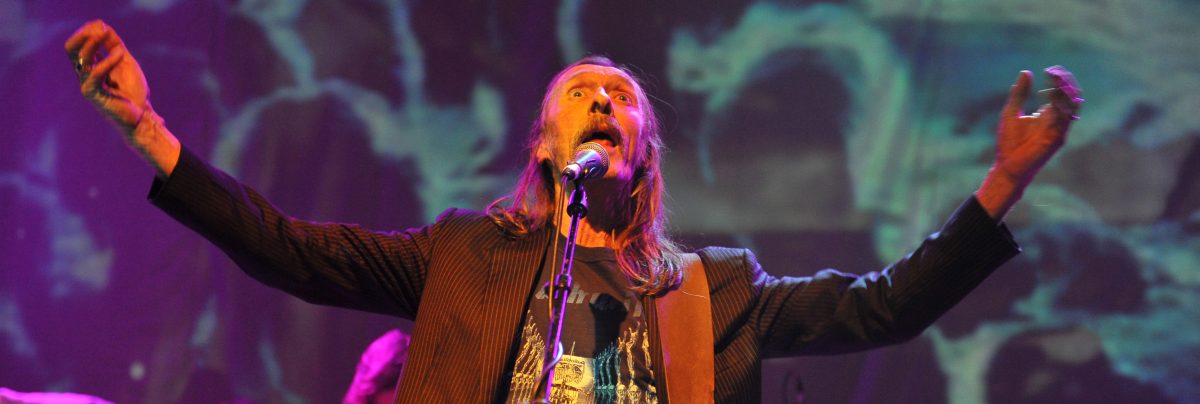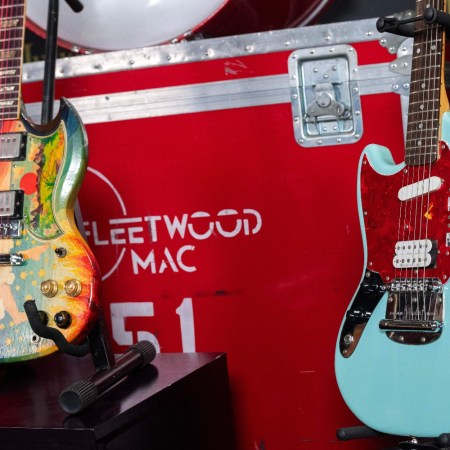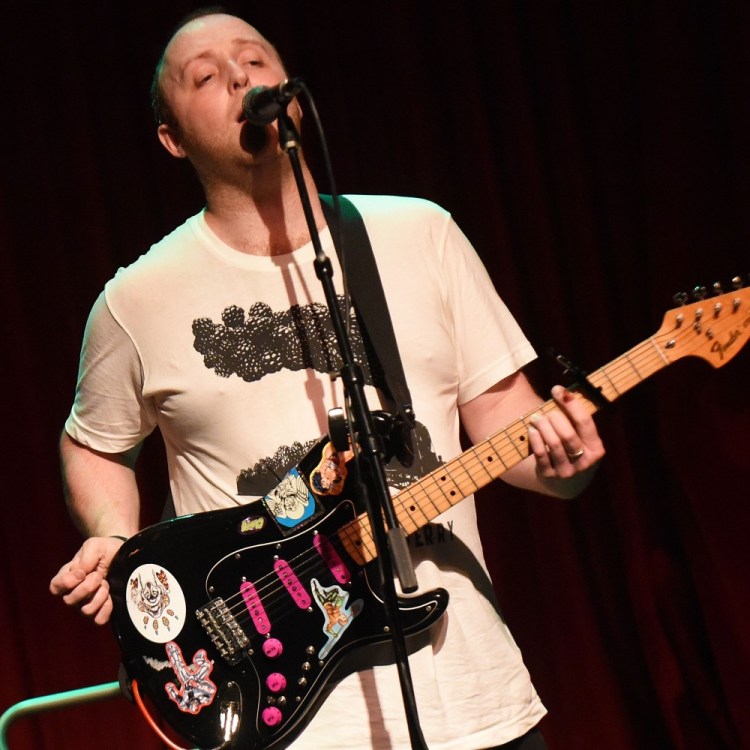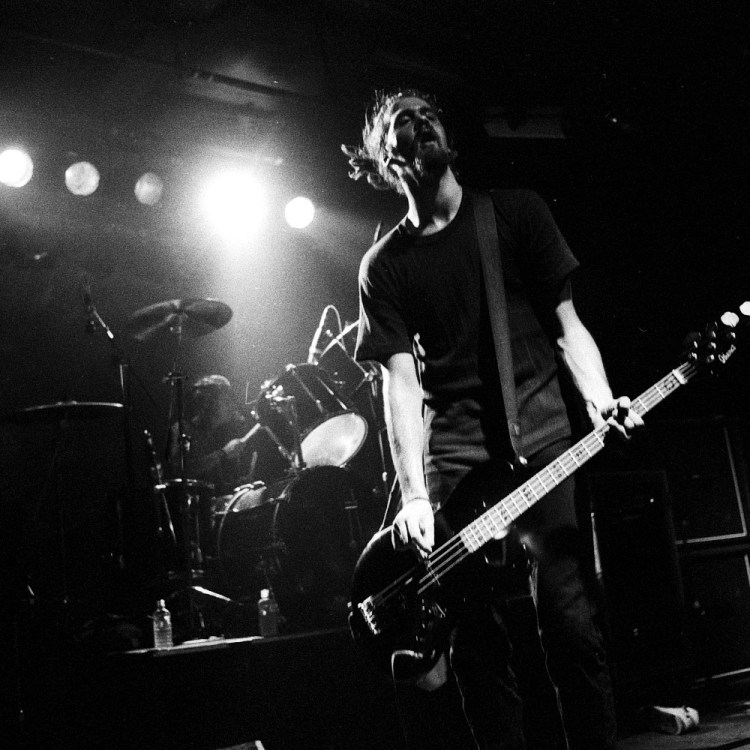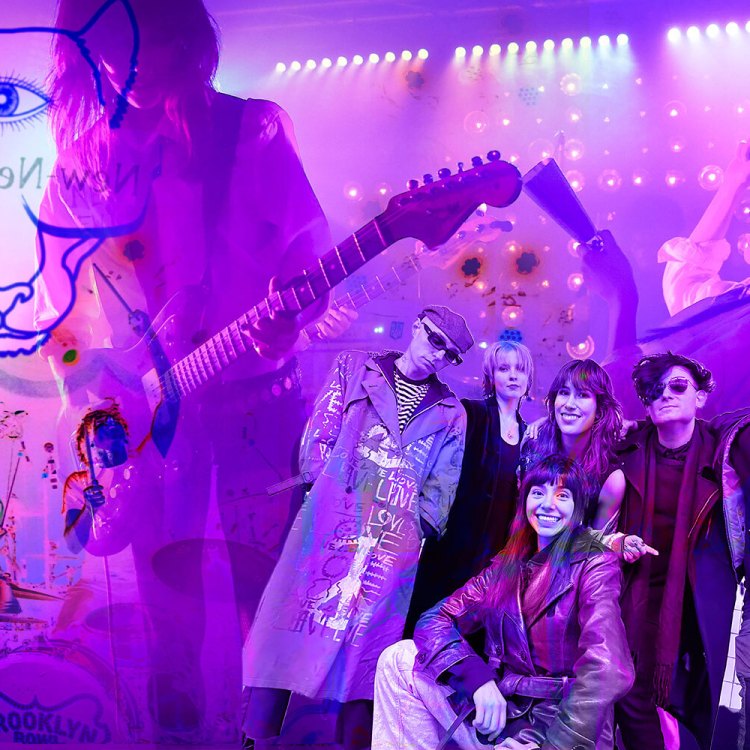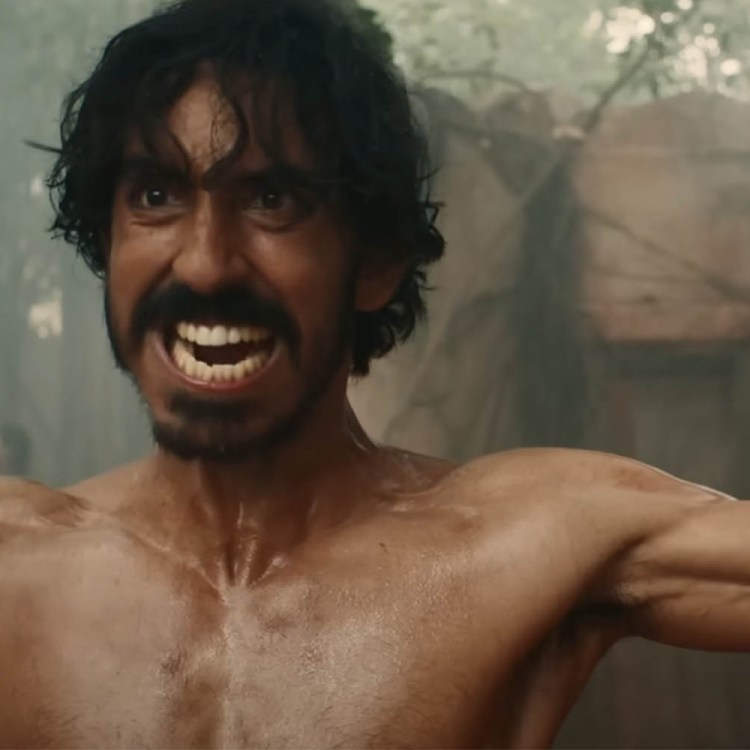Somewhere in our rock’n’roll dreams, the ones we’ve been having since Apollo circled the pale blue moon, we have envisioned a streamlined, art deco train — silver, steady, belching violet steam and rising to the sky to meet the Hawk.
Like Dean Moriarty in space, the earth unfolded below and before the Hawk, who had taught herself to fly at the speed of sound — to hear music in the rhythm of the wind beating against her cool feathers. As her wings cut the pale, fair air, she eyed the green hills below that puffed clouds out of the earth, the matter that made the bricks of heaven. And she eyed the smokestacks and the chimneys of death-loving cities, which spat out the bricks of hell. And she knew there was a rhythm they shared, one which would make the children of earth shake and shimmer and shudder with the joy of rock’n’roll.
That is the sound of Hawkwind, the band of bands, almost an onomatopoeia.
Listen, Hawkwind fans already know this, but the group is one of the greatest rock bands of all time. They are the missing link between Pink Floyd and the Sex Pistols, Neu! and Sabbath, Tangerine Dream and Deep Purple. They not only virtually invented space rock, they are space rock: All others who lay claim to that label are mere pretenders, aching to have a fraction of the opium and cough syrup-laced 5D dreams Hawkwind give us again and again. Since its debut in 1970, Hawkwind have been the pile driver in the planetarium, or maybe they’re the Hamburg Beatles, if the Fab Four had never left West Germany and instead become a Krautrock band. (Damn, that’s exactly what they are.)
Heck, if none of that intrigues you in investigating the half century starship voyage of Hawkwind, try this: I sometimes describe Hawkind as what the Grateful Dead might sound like if they had been led by Steve Jones of the Sex Pistols (and not Jerry Garcia), and if they each time they dropped acid, they did twice as much speed.
So using that to recalibrate your brain….
Road to Utopia is Hawkwind’s 31st studio album (although 1978’s 25 Years On, was released under the name Hawklords). Like many of the records they have released since 1970, it is full of surprises, right and left turns, and moments that are largely unrecognizable as Hawkwind. On Road to Utopia, Hawkwind have decided to revisit their existing material, recording vastly different versions of sometimes classic, sometimes obscure material. These are exotic, sometimes horn-filled and elaborate, sometimes hushed and elegiac, but the overall effect is remarkable, and compels you to rediscover these bands — and the half-century old concept of Hawkwind — all over again. It may be the best “restrained” yet engaging album by an artist known for his sparks and needles since John Cale’s Paris 1919, an album that Road to Utopia evokes to me.
Dave Brock, 77, has been the only constant in Hawkind since the band’s inception. He has always been the clear bandleader and conceptualist, and handled nearly all of their guitar work and most of their vocals.
RealClearLife spoke to Brock about Road to Utopia and the magic rumble that was, is, and always will be Hawkwind.
“I mean the next one we do will be different again!” says Brock, over the phone from a rehearsal studio in London. “It’s a weird old one because when we did our tour we were actually accompanying ourselves by doing an acoustic set prior to doing the electric one, you see. So we set out to document that, fairly simple, and we thought, and we started doing an acoustic album and then it went on to the way it turned out now, you know. Obviously, it changed when we got (legendary string arranger) Mike Batt involved.”
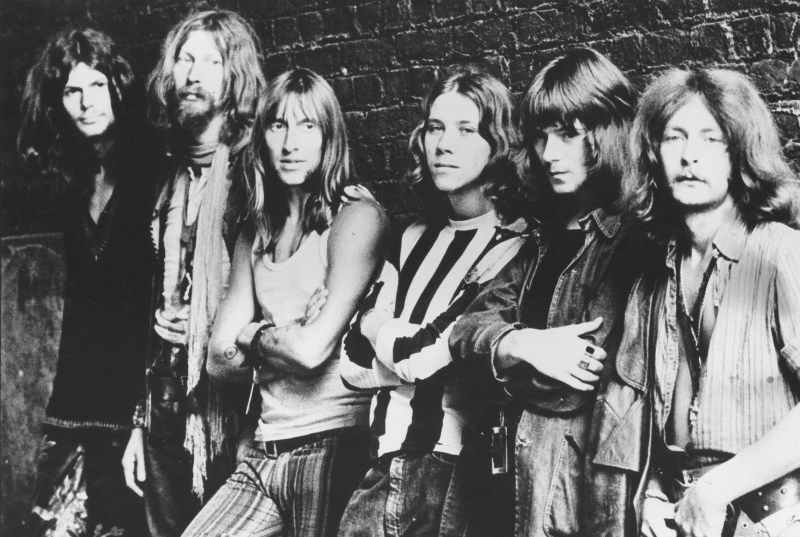
Tim Sommer: I think there’s some stuff on here that’s absolutely timeless on this record, and “Wrong Step” is an absolutely beautiful example of that. As I think is “Hymn to the Sun.”
Dave Brock: Yeah, well I mean “Hymn to the Sun” is Magnus (Martin, guitarist and keyboardist in the current version of Hawkwind). Magnus is a classically trained guitarist and he does he brings his little influence into the band. This is what people do anyway — well, what they’re supposed to do anyway — when they join up with a band is bring their little individual artistry into the band. And the thing with Magnus, he’s done that.
These musicians bringing their own artistry into the band, is that one of the ways that it has been kept fresh? Was it sort of an intentional idea built into Hawkwind, to keep a relatively fluid band membership?
D.B.: Well, it’s not that, it’s just that people come and go. I mean, except Richard (Chadwick) our drummer, he’s been in the band for thirty years now and (bassist) Niall (Hone), who I’ve known since he was a baby. I’ve known his mom and dad for many years. And Niall has been in the band for ten years now, so they’re just sort of long-term members, and other people come and go. It does make it interesting, yeah.
Now you mentioned that this evolved out of acoustic sets you were doing within the concerts so the concept for doing this album existed before you ran into Mike Batt.
D.B.: (Laughs) Yeah, it did.
And you brought in Mike Batt because he seemed like the person best suited to elaborate the concept?
D.B.: I mean, he’s worked with Art Garfunkel and Moody Blues and Paul McCartney, he’s worked with a huge amount of famous people doing arrangements and conducting orchestras. And I mean the funny thing is we were getting our visas in the American Embassy, that’s how we met him, you know. We were queuing up to get our visas to play in America, and Mike was behind us. And he also did a recording with Lemmy I think in 1998, “The Eve of Destruction,” believe it or not. (Laughs) That was a strange, odd thing that he’d worked with Lemmy as well, so it was all these strange connections.
It’s interesting you mentioned the Moody Blues — I kind of feel that there’s a strange affinity almost between this record and Days of Future Passed.
D.B.: Yeah, yeah I think you could say that, actually.
Eric Clapton plays on Road To Utopia, on “The Watcher” (a song originally recorded in 1972). Now my understanding is that you go a long, long way back with Eric Clapton.
D.B.: Yeah, yeah I’ve known him since we were about 17 or 18.
How did you know him?
D.B.: We used to actually hang out together in a place called Richmond, in Surrey and we used to sit around playing blues guitar and all that. And we used to go over to a jazz club on Eel Pie Island that used to have lots of jazz bands playing there, and I ended up playing with a boogie piano player in the intervals there on a Saturday night, and Eric went on to play with the Yardbirds. Also, after he became famous, sometimes I would pop into Eric’s house… he was renting a house in Ladbrook Grove. I used to pop in there for the odd cup of tea on a Saturday afternoon. (Laughs) There’s a long period of time elapsed…about 30 years elapsed between when we’d seen each other. Someone got in touch with me asking about Eric, they were doing a biography about Eric and they got in touch with me to ask me a lot of questions about our early days and all that. And that’s actually how we got in touch with Eric again.
So did it feel odd playing with him after all this time?
No, not at all. We got on wonderfully well. It was if we hadn’t seen each other for about one month, which is quite strange. Oh, nice to see you again, old chap. (laughs) Yeah we were talking about different blues musicians and all that. It was quite interesting… but yeah, it was if there hadn’t been that huge a gap. Don’t forget Ginger Baker did play with us for a year (1980/81)– so Eric asked, “How did you get on with Ginger?” “Well, Ginger’s a bit of a quirky character but we got on with him alright cause we’re all a bit quirky as well. (Laughs) We liked Ginger, it was all right so there you go. You know, if Lemmy had been alive, he could have sung “The Watcher.” Lemmy has always been a big admirer of Eric Clapton. That would’ve been wonderful.
I think it’s easy to overlook that Hawkwind came from these classic blues and R&B roots, though if you look really closely, you see the same kind of drone, the same kind of overdrive, in both classic blues and Hawkwind.
Well I used to listen to a guy called Big Bill Broonzy, who was a wonderful guitarist and singer who came over in the late fifties. Country blues basically — Sonny Terry and Brownie McGhee, y’know… we were sort of interested in country blues more. We were sort of influenced in a way by more country blues than city blues, you know.
And it seemed to me Hawkwind almost translated that sort of four-to-the-floor and drone element in a very, very pure way, even though people wouldn’t have necessarily picked it up in your music.
Yeah, it’s a strange odd thing. It’s that transition. There’s a guy called Chris Barber, I don’t know if you’ve ever heard of him. But he’s got this band: Chris Barber’s Jazz Band, playing really quite traditional New Orleans jazz. Chris actually was one of the great innovators of bringing American blues musicians over to Britain. He used to play in various places around London and one day they were doing a free gig in the park… he had a young guitarist named John Slaughter playing electric guitar. And when Barber said, I’d like to introduce our new young guitarist John Slaughter, we’re gonna play a few blues, all these people started booing him, you know? Because they were so entrenched in their ways of New Orleans that when someone came on and started playing the electric blues… it was like when Dylan went electric.
And there’s sort of this, I want to say almost 16-beats-to-the-bar element in both Hawkwind and in skiffle, and skiffle, of course, evolved out of Chris Barber and the 1950s Trad Jazz movement. (Note: this exceptional period in British rock is remarkably well documented in Billy Bragg’s must-read book, Roots, Radicals, and Rockers: How Skiffle Changed the World).
Well, yeah we used to play that sort of, (laughing and singing) “Freight train, freight train” all these skiffle songs… I know lots of them… Chris Barber’s a great influence actually on this whole country, believe it or not, cause he brought over a lot of blues musicians — he was doing trad jazz, new Orleans jazz, but he brought over Muddy Waters, a lot of the top blues musicians from America — it was really interesting. And it did change basically the concept of British music in a way by the great influence, the Rolling Stones and so on, bringing these musicians over which did influence a lot of young people, who were musicians.
Now, going back to Road to Utopia I noticed that you favored songs from the relatively brief Bob Calvert era and the Hawklords era, which I thought was an interesting choice.
Yeah, well that’s because when we started doing this, it was the 30th anniversary of the death of (Hawklords/Hawkwind vocalist) Bob Calvert. And on tour we were doing a lot numbers that Bob and me had written, which were very popular, so if we’re gonna do something we’re gonna do it differently. And Bob liked to do things different and I’m sure he would appreciate doing these songs different from the way they were then if you see what I mean.
Now, Bob Hope and Bing Crosby did a film called The Road to Utopia.
They had a few road movies didn’t they?
…and one of them was called Road to Utopia.
With Dorothy Lamour, wasn’t it?
Yes.
Well there’s no connection there, but there could be! People could read it in there. (Laughs)
Now as long as we’re reading into things, can you explain the symbolism of the painting on the sleeve?
Oh, the cricket match you mean? Well you see Bob (Calvert) had actually recorded a song called “The Cricket Star.” He dressed up in his whites and with his cricket bat and we thought “well, that’d be a good idea” let’s all get dressed in the same pose with a cricket bat. And we thought it’d be a good idea to have a flying saucer in there — which is the silver machine — flying overhead trying to catch the cricket ball. And you’ve got Eric Clapton sitting in as the next man in to bat in the score box, and of course Mike Batt is the umpire and we got all the characters in it. We thought we’d do something different, you know.
Will Americans we ever get a chance to see Hawkwind again? (Note: Although Hawkwind is an extremely popular live act in Britain and Europe, the band has not toured North America in nearly a decade; however, a “fake” Hawkwind, led by 1970s’ Hawkwind member Nik Tuner, toured the U.S. multiple times in the last few years).
I dunno…Will we ever go to America? Yeah, yeah, well actually the unfortunate thing is (Nik) Turner really f*cked us up. Cause we were about to do, you probably know, we were about to do quite a big tour and he went over there and completely ruined everything we’ve done, and a lot of these promoters just don’t want to have anything to do with us… they say “well who the f*ck is Hawkwind?” Though we own the name, he actually used our name in a derogatory way and really screwed us up basically. Though, we had a huge court case that went on for four years.
Which you won, correct?
Yeah, we won. We own the rights to the name. But our name got sullied. Over here we do big shows and in Europe and Australia and all that and of course we’re fine but unfortunately he sullied our name in America.
As sad as that is…what happens next for Hawkwind?
What’s next, well…the next album’s gonna be weird, I’m sure. Yeah, we’ve got the 50th anniversary next year and we’re playing a few really big festivals, I’m sure we’ll be doing some interesting things. At the moment doing this tour we’ve got a really great light show together which should be quite spectacular as well.
Did you ever imagine that this would be 50 years?
No, never… we only used to live for the week. (laughs) Then as time goes past, you’re booking dates for next year and festivals for next year. Who knows what’s gonna happen? Music is supposed to be an art form. I mean that’s the whole objective is… it’s an artistry, it’s like painting pictures. As I always say, it’s painting pictures with sound and if you can do nice things with sounds or make ‘em different or spook people with the sounds, then that’s what people want, innit really?
This article was featured in the InsideHook newsletter. Sign up now.
